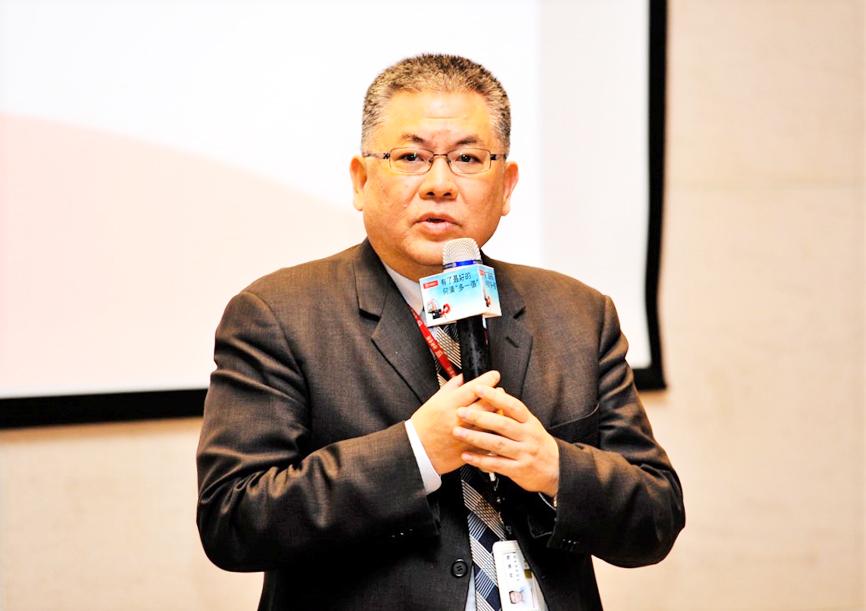Taishin Financial Holding Co (台新金控) will continue boosting its online banking service Richart to protect its lead as three Web-only banks gear up for their launch before the end of the year, the company told an investors’ conference in Taipei yesterday.
“We currently have a total of 2.25 million digital savings accounts, which suggests a market share of more than 40 percent. With our award-winning Richart service, we are confident about maintaining our advantage,” said Oliver Shang (尚瑞強), president of Taishin International Bank (台新銀行), the banking arm of Taishin Financial.
The bank in August launched a financial ecosystem, dubbed Richart Life, in cooperation with more than 20 partners in various industries such as wholesale, retail, department stores, tourism, air travel, food and dining, telecoms, e-commerce and food delivery, Shang said.

Photo: Kelson Wang, Taipei Times
As the bank offers reward points for consumers who use the services in the shared marketplace, more than 1 million users have signed up as members over the past three months, he said.
“We will continue expanding our ecosystem, providing more rewards for our users and enabling them to conveniently shop with our payment tools,” Shang said.
Taishin Bank reported a net profit of NT$3.53 billion (US$122.44 million) for last quarter, down 2 percent from a quarter earlier.
Net interest margin slid from 1.22 percent to 1.13 percent at the end of September, it said.
However, profit grew 20 percent from a year earlier, as net fee income generated from its credit card operations gained 9.5 percent annually to NT$309 million and those from the corporate loans increased 31 percent to NT$399 million, company data showed.
Corporate loans rose 7.2 percent annually to NT$551 billion last quarter, with a focus on small and medium-sized manufacturing enterprises, while mortgage loans grew 13 percent to NT$315 billion, data showed.
By comparison, net fee income from its wealth management operations was flat, while consumer loans dropped 8.6 percent annually, the data showed.
Overall, the bank reported an annual drop of 2 percent in net profit for the first nine months to NT$9.8 billion, as it had not fully recovered from a plunge in investment gains in the first quarter.
Cushioned by the rising profit of Taishin Securities Co (台新證券), Taishin Financial’s net profit for the first three quarters slid 1 percent to NT$11.7 billion.

TECH BOOST: New TSMC wafer fabs in Arizona are to dramatically improve US advanced chip production, a report by market research firm TrendForce said With Taiwan Semiconductor Manufacturing Co (TSMC, 台積電) pouring large funds into Arizona, the US is expected to see an improvement in its status to become the second-largest maker of advanced semiconductors in 2027, Taipei-based market researcher TrendForce Corp (集邦科技) said in a report last week. TrendForce estimates the US would account for a 21 percent share in the global advanced integrated circuit (IC) production market by 2027, sharply up from the current 9 percent, as TSMC is investing US$65 billion to build three wafer fabs in Arizona, the report said. TrendForce defined the advanced chipmaking processes as the 7-nanometer process or more

China’s Huawei Technologies Co (華為) plans to start mass-producing its most advanced artificial intelligence (AI) chip in the first quarter of next year, even as it struggles to make enough chips due to US restrictions, two people familiar with the matter said. The telecoms conglomerate has sent samples of the Ascend 910C — its newest chip, meant to rival those made by US chipmaker Nvidia Corp — to some technology firms and started taking orders, the sources told Reuters. The 910C is being made by top Chinese contract chipmaker Semiconductor Manufacturing International Corp (SMIC, 中芯) on its N+2 process, but a lack

NVIDIA PLATFORM: Hon Hai’s Mexican facility is to begin production early next year and a Taiwan site is to enter production next month, Nvidia wrote on its blog Hon Hai Precision Industry Co (鴻海精密), the world’s biggest electronics manufacturer, yesterday said it is expanding production capacity of artificial intelligence (AI) servers based on Nvidia Corp’s Blackwell chips in Taiwan, the US and Mexico to cope with rising demand. Hon Hai’s new AI-enabled factories are to use Nvidia’s Omnivores platform to create 3D digital twins to plan and simulate automated production lines at a factory in Hsinchu, the company said in a statement. Nvidia’s Omnivores platform is for developing industrial AI simulation applications and helps bring facilities online faster. Hon Hai’s Mexican facility is to begin production early next year and the

Who would not want a social media audience that grows without new content? During the three years she paused production of her short do-it-yourself (DIY) farmer’s lifestyle videos, Chinese vlogger Li Ziqi (李子柒), 34, has seen her YouTube subscribers increase to 20.2 million from about 14 million. While YouTube is banned in China, her fan base there — although not the size of YouTube’s MrBeast, who has 330 million subscribers — is close to 100 million across the country’s social media platforms Douyin (抖音), Sina Weibo (新浪微博) and Xiaohongshu (小紅書). When Li finally released new videos last week — ending what has